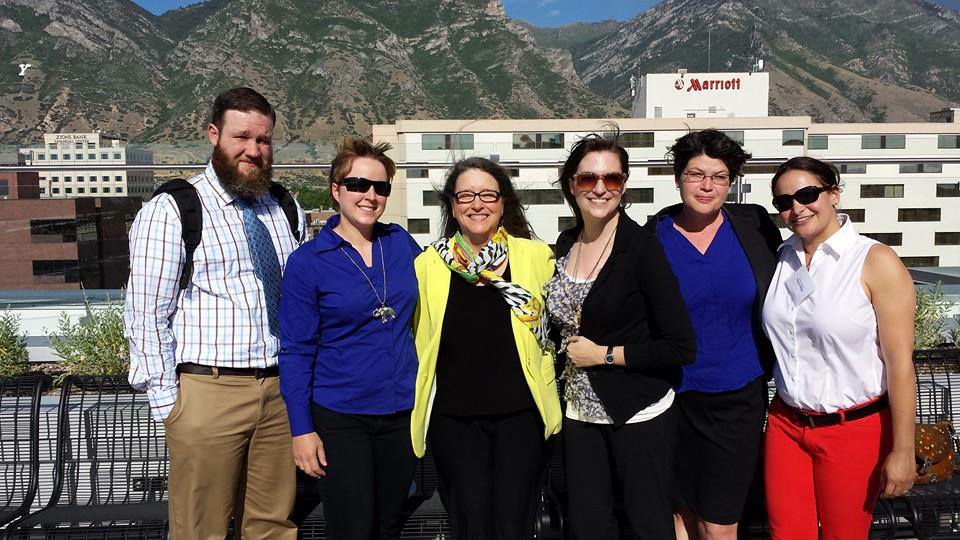Whayne Closes Year as Agricultural History Society President

(From left) Edward Andrus Denna Clymer, Jeannie Whayne, Kelly Jones, Jama Grove and Diana Chen
FAYETTEVILLE, Ark. – Jeannie Whayne, professor of history and co-director of the Teaching and Faculty Support Center, delivered “The Incidental Environmentalists: Dale Bumpers, George Templeton and the Origins of the Rosen Alternative Pest Control Center at the University of Arkansas” as her presidential address to the Agricultural History Society Saturday, June 21, in Provo, Utah. The address will be published in the society’s journal, Agricultural History.
"Jeannie Whayne has a great gift for teaching us something fresh and new and a bit surprising about Arkansas history,” said Elliott West, Alumni Distinguished Professor of History and the meeting’s keynote speaker. “Her talk was a wonderful example of that."
Whayne mined the newly opened Dale Bumpers Senatorial Papers, the research files of distinguished professor of plant pathology George Templeton and more than 70 years of agricultural experiment stations' bulletins and reports archived in Special Collections of the University Libraries to develop the premise of her address.
Whayne argues that Dwight Isley, Harry R. Rosen and William Baerg developed an “integrated pest management” approach in the 1920s that remained alive and served as an inspiration for Templeton and other agricultural scientists in later decades.
Templeton received a Bachelor of Science in Agriculture from the university in 1953 where Rosen, a professor of plant pathology known for his agricultural innovations, was his advisor. Templeton then went to the University of Wisconsin, earned a doctorate in plant pathology and returned to the University of Arkansas as an assistant professor in 1958.
During his tenure at the university, Templeton developed his own perspective on alternative approaches while Bumpers, a wilderness environmentalist, cultivated a similar point of view. By 1989 a meeting of the minds occurred between the two men that resulted in a congressional appropriation of $1.4 million and the founding of the Alternative Pest Control Center at the university. In 1996 a generous donation from Rosen’s daughter funded the construction of a building located on Maple Street and the center was renamed the Rosen Alternative Pest Control Center.
History graduate students Kelly Jones, Denna Clymer, Jama Grove and Edward Andrus and environmental dynamics graduate student Diana Chen attended the conference, some of whom presented papers. Whayne singled out Grove for special mention for her research on the evolution of alternative pest control measures at the University of Arkansas, work she completed while taking Whayne’s Agricultural History class in Spring 2014.
"Taking graduate students to national meetings is crucial to their development as future scholars and academics,” said Kathryn Sloan, chair of the Department of History. “I commend Dr. Whayne for her attention to professionalizing and mentoring her advisees."
Later in the summer, Whayne delivered “A Faustian Bargain? Modern Corporate Farming in the Age of Scientific Agriculture” at the World Conference on Environmental History in Portugal (July 8-12).
Whayne was installed as president of the Agricultural History Society at its meeting last summer in Banff, Alberta, Canada, and was designated a fellow of the society in 2009 in honor of her distinguished scholarship in the field and her service to the society.
The society was founded in Washington, D.C., in 1919 "to promote the interest, study and research in the history of agriculture." Incorporated in 1924, the Society began publishing the journal Agricultural History in 1927. The term "agricultural history" has always been interpreted broadly, and the Society encourages research and publishes articles from all countries and in all periods of history. Originally affiliated with the American Historical Association, the Agricultural History Society and is the third oldest history society in the United States.
Topics
Contacts
Jeannie Whayne, professor of history
J. William Fulbright College of Arts and Sciences
479-575-5895,
jwhayne@uark.edu
Darinda Sharp, director of communications
J. William Fulbright College of Arts and Sciences
479-575-3712,
dsharp@uark.edu
Kathryn Sloan, chair, department of history
J. William Fulbright College of Arts and Sciences
479-575-5887,
ksloan@uark.edu
Headlines
Affairs of the Heart
Find out how biomedical engineering professor Morten Jensen is developing innovative devices to produce better outcomes in cardiovascular medicine.
Students, Faculty and Alumni Kick Off Centennial Year of School of Law
Founded April 14, 1924, the School of Law faculty, students and alumni started the celebration of its centennial year with a Founders Day event and will continue with more commemorative events this coming fall.
Yearly Academic Award Winners, Ambassadors Recognized by Bumpers College
Schyler Angell, Lexi Dilbeck, Cason Frisby, Tanner Austin King, Anna Brooke Mathis, Carrie Ortel, Lucy Scholma, Kadence Trosper and student ambassadors were honored at the college's annual reception.
World Premiere of 'Cries from the Cotton Field' Slated for May 8
Cries from the Cotton Field chronicles the journey of 19th century Italian immigrants from northern Italy to the Arkansas Delta and ultimately to Tontitown. It will premier at 6 p.m. May 8 in Springdale Har-Ber High School.
Fay Jones School's Earth Day Event Spotlights Sustainable Materials and Projects
"One day doesn't seem like a lot, but one day can empower individuals and groups, energize them to work for change and innovate for transformative solutions," professor Jennifer Webb said of the students' design work.




